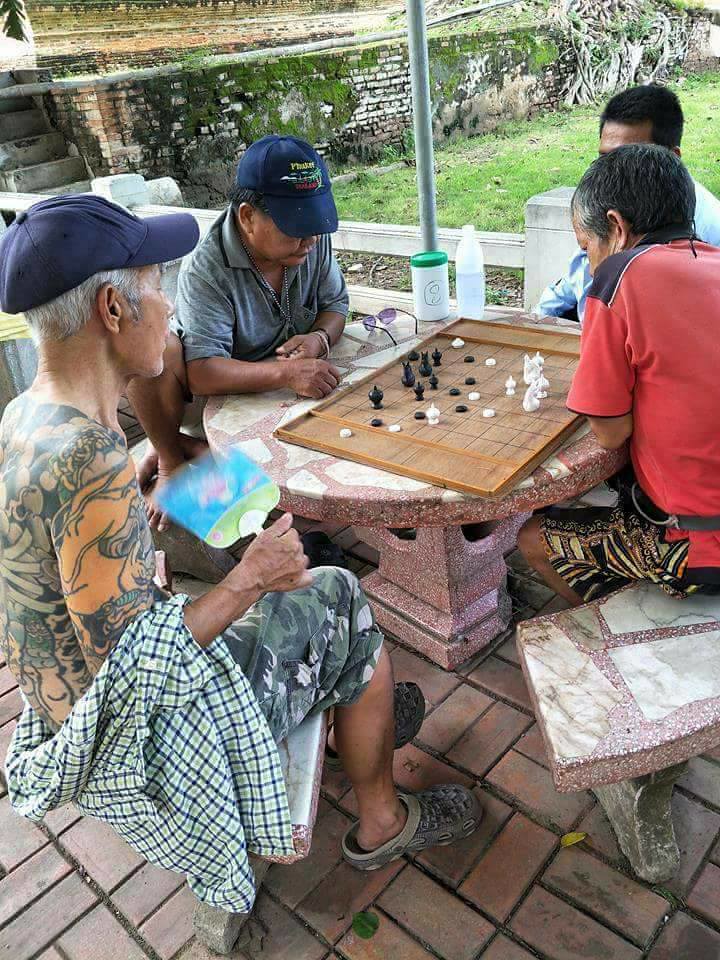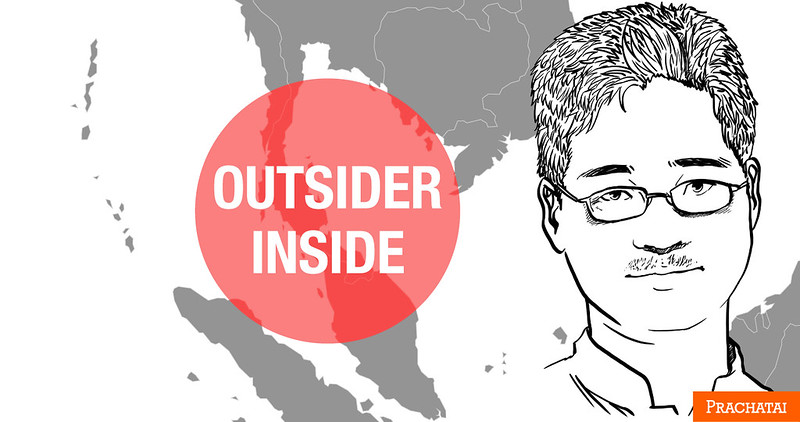An old Japanese man in Lopburi with almost his entire upper body covered by an impressive Japanese style tattoo was sitting outside, watching his friends playing chess. His tattoo was so impressive that someone asked permission to take his photo. He granted permission: something he shouldn’t have done had he wanted to continue his ‘ordinary life’. He probably didn’t know how people nowadays behave after they take a picture of something remarkable: post it on social media. It didn’t take long for it to go viral. Eventually, the post attracted the attention of the Japanese police, who made an official extradition request to the Royal Thai Police. The old man, locally referred to as ‘Kobori’ (a name taken from a famous Thai soap opera in which a Japanese soldier fell in love with a Thai woman during World War II) was a member of the yakuza (Japanese mafia) living in exile for 13 years, after he had been involved in the murder of another yakuza.

He didn’t speak Thai but somehow managed to maintain his life in exile, partly because local people regularly gave him ‘offerings’ in form of merit making called tham bun. And partly because, in these circumstances, Thais are simply nice. He was an old man from a foreign country, living alone in Thailand, who didn’t speak Thai. Helping a man in such circumstances would be regarded in the local culture as meritorious. On top of that, unlike in Japan, where tattoos tend to be considered as a trademark of the yakuza, in Thailand remarkable tattoos are connected with supernatural powers. I also couldn’t help imagining that the specific characteristics of a yakuza might also be seen as venerable.
Members of Japanese organized crime syndicates are known as yakuza, but are different from their counterparts in other countries for their non-underground nature. A yakuza organization might have an office with a signboard and yakuza members dress in distinctive ways. In short, they have never tried to conceal their identities. Yakuza organizations make money from illegal activities, such as protection rackets, prostitution, drug dealing, weapons smuggling, and human trafficking. Japan’s ambivalence about the Yakuza, which led to their public existence, as well as their involvement in crime, makes yakuza members intimidating to an ordinary person. They are capable of being soft if they choose, but in their softness there lurks something ruthless. Their distinctive appearance, roguish way of speaking, and aggressive attitude, all suggest that they are different from the rest of the society.
The arrest of Mr ‘Kobori’ made me think about another type of anti-social organisation, i.e. insurgents. Before 2013, I had no idea what Patani insurgents looked like. I vaguely imagined they might look like the roguish characters in movies and TV dramas. My imagination was certainly based on my notion of anti-social organisations like yakuza organizations or mafias in movies. Therefore, I was rather surprised when I saw pictures of Hassan Taib, the head of the BRN delegation, at the signing ceremony of the General Consensus for Peace Dialogue Process. He looked like an ordinary Malay man. He was not an exception. Later, I learnt that most insurgents looked like ordinary people.
I first met a leader of an insurgent organisation in person in March 2013, and since then I have had many opportunities to interview members of Patani insurgent organisations such as BRN, BIPP, two factions of the PULO, GMIP and MPRMP. Some of them acknowledged that they had been involved in military operations. Nevertheless, no one looked like a mafia member or different from the rest of the society.
On other occasions such as study trips, conferences, and forums, I also met members of non-state armed groups (NSAGs) such as GAM from Aceh, MILF, MNLF, and communist groups from Mindanao, ethnic groups from Myanmar and the Communist Party of Nepal. They also didn’t demonstrate any distinctively intimidating characteristic like members of yakuza organizations. Nobody looked roguish, ruthless, aggressive or intimidating. There were some women in these groups who played important roles too, which is completely different from yakuza organisations which are exclusively dominated by males.
Although yakuza and insurgents are both anti-social in character, there are fundamental differences. Yakuza organisations exist within a society, and they constantly violate the law. However, they need to leech off society for their survival. In other words, they can’t afford to destroy the structure of the society in which they live. They are involved in activities they know are criminal, and tend to be outlaws, while not capable of being ‘out-of-society’. Therefore, their code of ethics called ‘ninkyodo’ was there to justify their behaviour and to preserve their self-respect.
On the other hand, members of insurgent groups do not think that they are committing crimes. Their use of violence is essentially political and is justified by ideology in the context of their struggle. Both yakuza and insurgents are doing things against the ideals of society, but the reasons behind their behaviour are totally different.
To keep their negotiating power in society, yakuza organisations have to rely on a demonstration of power by sheer violence. Eradication, if not mitigation, of yakuza organisations is almost impossible. Every government has to manage these illegal or semi-legal organisations inside society. There will be no peace process or peace agreement between the government and yakuza organisations. The aim of the yakuza’s use of violence is to survive inside society, not to destroy it.
On the contrary, insurgents do not think their existence is antisocial because their common sense is simply different from the rest of the society. They want rather to establish a new form of governance based on their ideals, demanding things like justice, the right to self-determination, equal-treatment with the rest of society, recognition of their (cultural, religious or ethnic) identities, eradication of discrimination, acknowledgement of their ancestral rights, participation in the decision-/policy-making process and so on. This aspect is different from yakuza organisations. No yakuza organization has ever demanded such a thing (except possibly equal treatment with the rest of society). Therefore, once structural problems in society are fixed, insurgents have no further reason to resort to violence, and this is where negotiations, or even partnership and cooperation between a government and NSAG(s) can begin. From there they can develop a region or the country, on condition that the government acknowledges that the NSAG is not a bunch of bandits or a mafia, but an organisation with justifiable standpoints.
In the context of Patani or the southernmost provinces of Thailand, the insurgents, also known as ‘southern Bandits’ still see the Thai government as the coloniser of Patani. A negotiation between colonizers and bandits is almost impossible. If both parties are serious about the process, there must be engaged efforts to understand the opposite side. They don’t have to agree with the opposite side’s ideology, but the Thai state should listen to the insurgents and why they regard governance in the southernmost provinces as colonisation, and the insurgents need to listen to the state’s justification of the current form of governance.
Although talks between the delegations from Party A (the Thai government) and Party B (those who have different ideologies and opinions from the state) continue, propaganda materials from both side are still teeming with mutual accusations based on complacent self-justification. There will never be a fruitful peace process while each side is spreading this kind of propaganda.
The Thai government has had to face a challenging question from society, “why do you have to negotiate with a bunch of bandits?” In other words, the very legitimacy of the peace process has constantly been questioned. Unless the government sincerely explains that the party it is negotiating with is not a bunch of bandits or a mafia, but comprises non-state armed groups with their own justifications of struggle, society both in the conflict area and outside won’t see any benefit from the peace process. The process itself has never been fully explained by the state to the people.
Under the current situation in which there hasn’t been a sound mutual understanding between the negotiating parties, talking about such an ambitious and premature plan as the setting up of a safety zone seems preposterous. This kind of plan is not a tool for building mutual trust, but building mutual trust is a necessary condition to accomplish this. Instead of wasting time talking about an unworkable plan in the current circumstances, both sides can talk about a small but congenial and significant point such as what they want to be called by the other side. Apparently the government isn’t happy being referred to as the coloniser of a part of its legitimate territory. At the same time, the insurgents, firmly believing that their causes are perfectly justifiable, find it unacceptable to be called a bunch of ‘bandits’.
So far, both sides are engrossed in justifying their mutual standpoints, utterly neglecting the importance of understanding the opposite party. Accordingly, the legitimacy of the peace process itself has never been acknowledged by society. This effort requires considerable determination from both sides, but without this, the current peace process won’t make any progress because constructive cooperation between the conflicting parties is the fuel for the process, which a
report from the International Crisis Group described as ‘no traction’ [1].




